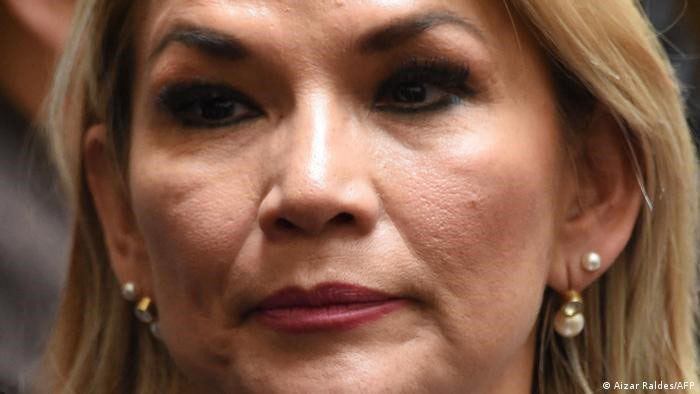LA PAZ, (Reuters) – Bolivia’s former president Jeanine Anez yesteday appeared via videolink for a first hearing before a judge over accusations she helped foment a coup against the country’s socialist government.
During the hearing, Anez and her former ministers of energy and justice, Rodrigo Guzman and Alvaro Coimbra, were accused of sedition, terrorism and conspiracy.
Public prosecutor Harold Jarandilla said the defendants used security force allies to push then-President Evo Morales to resign after contested elections and “rigged” events in the political vacuum that followed to install her as interim president.
Jarandilla said Anez posed a flight risk since she was discovered “skillfully hidden” in a neighbour’s home in the central city of Trinidad during a police raid on Saturday, and he called for her and her ministers to be held on remand pending trial for six months.
According to an arrest warrant seen by Reuters, several other ministers from the Anez government are also sought along with police, military and opposition figures.
The crackdown on former members of her conservative administration represents a sharp change of direction by Morales’ former economy minister, President Luis Arce, who pledged to “rebuild and stabilize” the country when he led the Movement for Socialism back into office in October.
It has sparked fury among opposition leaders who have called for a civil uprising against a “dictatorship”, and expressions of concern from rights groups and global powers.
Both the United States and the European Union issued statements over the weekend urging Bolivia to follow due process and ensure prosecutions were carried out without political interference, a call echoed by rights groups including the InterAmerican Commission on Human Rights (IACHR) and the office in Bolivia of the U.N. High Commissioner for Human Rights.
The Bolivian Episcopal Conference (CEB) called for the immediate release of those detained.
“The politics of revenge and resentment and a justice system dependent on political power do not create trust in the people and will harm us all, sooner or later,” the CEB said in a statement issued late on Saturday.
Anez, 53, a lawyer and former senator for the centre-right Democrat Social Movement took power after Morales resigned amid widespread violent protests and claims backed by international organizations that he fraudulently won the election.
At least 33 people were killed in violence that followed the election, 30 of them after Anez took office.
Anez has rejected the charges as “political persecution” and insisted she took part in a “constitutional succession” to replace Morales after he stepped down.
She has appealed to the Organization of American States and the European Union to send observers to evaluate the prosecutions of her and her colleagues, and has said she should benefit from immunity as a former president.
The arrests continued on Sunday with the detention of Yassir Molina, a community leader of the Cochala Youth Resistance group whose often masked members protested against Morales and celebrated Anez’s succession with fireworks.
Eduardo del Castillo, the minister of government, told a press conference that the movement had been classified by the IACHR as an “armed group.”
“He will be investigated for the crimes of criminal organization, possession, carrying and use of conventional firearms, attack against public property and deprivation of liberty, among others,” he said.
Andronico Rodriguez, president of Bolivia’s Chamber of Senators and a senior figure in the ruling party, said the group had “exercised violence without measure, sown terror and fear before the population, and must be held accountable.”






